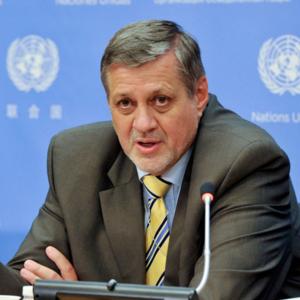SRSG Ján Kubiš Remarks High Level Consultative Meeting: Development of the 2nd National Action Plan on UNSCR 1325
3 October 2018, Al-Mansour Hotel, Baghdad
Excellency, Mr. Mehdi Al Allak, Secretary-General of the Council of Ministers
Distinguished government, local authorities and civil society representatives
Excellency Amb. Matthijs Wolters
Distinguished members of the international community
Distinguished Head of UNWOMEN Ms. Dina Zorba, other UN colleagues
Ladies and Gentlemen,
I am pleased to be part of this consultation process for the development of the 2nd National Action Plan on the implementation of the UNSCR 1325. This process has full support and attention of the UN here but also in New York. For the first time ever your Coordinator, Ms. Suzan Aref, briefed together with myself on 8 August 2018 the UN Security Council on progress, achievements and challenges in promoting the WPS agenda. I also distributed to the UNSC a document prepared by women activists and civil society on gender perspectives that needs to find reflection in the next government’s program and activities.
I commend the Cross-Sector Task Force as well as the Committee responsible for drafting the report on the implementation of the 1st NAP. I am encouraged to see progress in the protection pillar and dedicated efforts to strengthen the participation pillar. Yet, the gender inequality in Iraq remains, with worrisome signals that it is deepening, not least because of the heavy burden and consequences of fighting the terrorist Da’esh.
Moreover, following instances of harassment of women candidates for the COR elections, now we witness a series of attacks on high-profile women from different parts of the Iraqi society. In the past month alone, four socially-active women were murdered. In Basra, Suad Al-Ali, a women’s rights activist was gunned down. And in Baghdad, Tara Fares, a social media activist, is the latest casualty. Other civil society activists, including women are harassed and targeted by social media and political threat campaign for their work and contacts, among others, with foreign embassies. This is unacceptable. We condemn violence and intimidation of women active in political and social spheres. Only once politically and socially active women are protected and safe, Iraq can claim to be making real progress towards women’s rights, equality and empowerment.
Ladies and Gentlemen,
In the May 12 COR elections, women won 22 seats outside the 25% quota, with some obtaining the highest votes in comparison to their male competitors – a development that signaled the electorate’s expectation of women’s meaningful place in the leadership positions, in the political process. Sadly, this is not the case. Political forces that negotiate the formation of the government do so, again, without participation of women. We all need to ask: when the political leaders intend to deliver on their pledges to empower women and advance their rights as a part of the democratic entitlement of all Iraqis thus strengthening equal representation and inclusiveness? The time is now. Otherwise, all the exclamations about commitment to equality of women and values of democracy continue to sound hollow.
Myself, my Deputy Alice Walpole and my Gender Advisor Nono Dihemo have been engaging with political leaders at federal and KR levels encouraging them to include women in the negotiations, nominate and elect them to responsible leadership positions in the new parliament and government, in the diplomatic service. At the beginning of August, my Deputy Special Representative met with women parliamentarians in the new COR who agreed to establish a cross-political women’s parliamentary caucus. The caucus would ensure unity of effort towards the adoption of laws, including advancing and protecting women, girls and children’s rights, gender parity and equality of rights and opportunities. The UN in Iraq has pledged to support their work. Yesterday I discussed UN support and cooperation with now the Prime Minister- designate H.E. Mr. Adel Abdel Mahdi.
Ladies and Gentlemen,
The development of a new NAP with all the diversity and complexity of issues will require continuous coordination and collaboration across sectors. It is necessary to make sure that the lessons learned, from the previous Plan influence the design of the new one. It is equally imperative that the vision of broader civil society on political, social and economic empowerment of women, decent livelihood, including health care an education and, importantly, viable perspective for young generation, is included in the process. By making your deliberations open to the society, by publicly broadcasting them you could mobilize even broader support for your objectives.
We will continue to impress on Political Parties who are key to advancing the participation of women in all processes to include women in their leadership structures. Men advocates must assume a more prominent role in this process. I would also like to urge the new Parliamentarians to consider gender responsive budget in the next budget law to enhance the implementation of the NAP.
We will also continue to advocate for the establishment of a dedicated institution with budget and authority to coordinate the implementation of the NAP and national frameworks and policies on WPS. The head of the institution shall represent and promote the interests of women in the Council of Ministers’. That will help establish and implement a single Iraqi strategy on women and sole oversight body.
The UN family in Iraq based on the UNAMI mandate remains committed to assisting Iraqi women in promoting and protecting their rights, aspirations and dignified future, in advancing the INAP and overall WPS agenda. It will mobilize support of the broader international community, including through a newly-established International Gender Group from among embassies here in Baghdad.
Speech by


